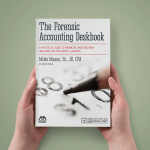Big Divorce Mistake #1: Not Getting Financial Disclosures Under Oath
Obtaining financial disclosures under oath from your spouse is a great first step. That can be in response to interrogatories or an affidavit. If your spouse lies under oath, it will help make a better case for relief from the court.

The Forensic Accounting Deskbook by Miles Mason, Sr. JD, CPA, published by the ABA Family Law Section
Discovery is discussed at length in The Forensic Accounting Deskbook: A Practical Guide to Financial Investigation and Analysis for Family Lawyers, Second Edition, authored by Miles Mason, Sr. JD, CPA and published by the ABA Family Law Section.
See Mason’s complete list of the 10 Big Divorce Financial Mistakes.
VIDEO TRANSCRIPT:
Tracy Coenen: Now I know in a divorce that the spouses are typically going to be required to fill out a financial affidavit or some sort of similar document. Can you tell us more about those and how they’re used in the divorce?
Miles Mason: Generally there’s two categories. First, there’s a typical, if there is a requirement for a particular financial disclosure, the court, whether it be the local court or the overall state law will have a particular form for a divorcing spouse to fill out. Usually that’s going to include assets and debt, usually not a lot of detail and it may even be less detailed than a general financial statement, which is pretty awful.
Miles Mason: But as well as income and expenses by category, and then other states don’t have particular forms. So, but you do in all states, you have to answer the question, whether it be in discovery or on a particularized form, you’re going to have to disclose income, assets, debts, and expenses. If you don’t make those declarations, how do you settle the divorce? It’s dad-gum near impossible. So there’s going to be some sort of financial disclosure along the way.
Tracy Coenen: What happens if the spouse lies on that disclosure?
Miles Mason: It depends on whether or not it’s under oath. If it’s an informal production for a settlement, there may not be a lot that a spouse could do to undo it, unless there are specific provisions within that state law about fraud and reliance regardless whether the statements are under oath. But specifically if there are interrogatories that have to be answered under oath, they’re answered under oath subject to the criminal penalty of perjury. The other spouse relies on them. There’s a divorce settlement, and we find out later and can prove that the answering spouse committed perjury and lied, namely omitting an important asset, then the divorcing spouse who was defrauded can open up the divorce, and that’s very, very key and a very important issue in settlement. Do you have enough information that you can rely on in order to draft a settlement?
Thank you to Tracy Coenen, CPA, CFF for inviting me to join her in this video series. Tracy is a forensic accountant practicing in Milwaukee and Chicago.









